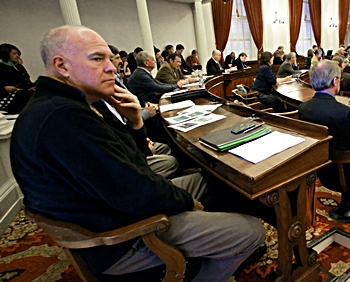Vermont Senate minority leader: Convention of states as attack on free speech, Citizens United

By Bruce Parker | For Vermont Watchdog
A Vermont lawmaker says a proposed constitutional convention of states is an attack on free speech and sets up the possibility for a runway convention.
BAD IDEA: State Sen. Joe Benning says a convention of states could rewrite the U.S. Constitution on multiple issues ranging from corporate donations and a balanced budget to gay marriage and abortion.
The Vermont Senate on March 20 voted in favor of an Article V constitutional convention to overturn Citizens United, the landmark 2010 Supreme Court decision that affirmed the First Amendment right of corporations and other groups including labor unions to spend money on political campaigns.
In an interview with Vermont Watchdog, Vermont Senate Minority Leader Joe Benning, R-Caledonia blasted the resolution.
“I see it as an attack on free speech,” Benning said. “I did not want to give my vote to something that clearly restricts free speech, because I think the First Amendment is one of the most important amendments we have, if not the most important.”
Benning said he opposes the constitutional convention on process grounds as well, arguing the meeting likely would spiral out of control.
“In calling for an Article V convention, the language of the United States Constitution calls for a gathering to propose amendments — plural. What that means is when the convention assembles it’s anybody’s guess as to what will come out of it.”
While supporters of a constitutional convention say the meeting could be restricted to a single issue, Benning said a convention of states could rewrite the U.S. Constitution on multiple issues ranging from corporate donations and a balanced budget to gay marriage and abortion.
Article V of the U.S. Constitution says that states may propose amendments if two-thirds of state legislatures call for a convention. Ratification of a particular amendment would require the approval of three-fourths of the state legislatures. More than 20 states have passed resolutions in favor of a federal balanced budget-amendment.
The Legislature’s push to reverse Citizens United should be a red flag to conservatives who say an Article V convention is a pathway back to limited government in Washington, D.C. In December, conservative lawmakers from 32 states gathered at Mount Vernon to discuss a state-initiated convention and to identify specific amendments. Conservatives aren’t the only ones with an agenda to amend the U.S. Constitution, however.
Wolf PAC, a left-leaning political action committee dedicated to ending the influence of money in politics, says a convention of states is necessary to end “corporate personhood” and “restore true democracy.” The group advocates a 28th Amendment that would undo Citizens United. Other left-wing groups seeking a convention of states include Code Pink, Sierra Club and Progressive Democrats of America.
Skeptics of the convention-of-states concept generally warn against the ambiguity of the process, the lack of any historical precedent, and the potential for one’s political opponents to rewrite the U.S. Constitution — the so-called “runaway convention.” Others say Washington politicians would follow the new amendments.
“Let’s say there is a constitutional convention with no runaway, and you ratify an amendment that requires a balanced budget at the federal level. Then what? Do you really think they are going to abide by it?” asked Scott Landreth, a field coordinator for the Tenth Amendment Center, a think tank that promotes federalism and a return to strict constitutional government.
Landreth envisions a long and risky process of amending the Constitution, after which Washington politicians simply ignore the results.
“I appreciate anyone who truly wants to limit the federal government and return it to its constitutionally delegated powers,” Landreth said. “But I’ll tell you this — if and when there’s a constitutional convention and these liberty amendments get passed, and the federal government ignores them just like they ignore the rest of the Constitution, states will still be trying to use nullification to defend those liberty amendments as well.”
To proponents who say an Article V convention is necessary to get money out of politics, Benning contends amending the U.S. Constitution would magnify the influence of money beyond anything the country has ever seen.
“When you talk about the amount of money being spent in politics, I think all the money that has been spent in politics in the past hundred years would be dwarfed by the amount of money that could be spent to influence such a convention,” he said. “Everybody with a viewpoint is going to spend every nickel they can to try to influence the United States Constitution.”
The solution, Benning said, is to trust voters.
“This resolution implies that voters are not smart enough to listen to messages and come to their own conclusions,” he said. “I think Vermont voters are intelligent enough that when they hear a message they don’t like, it doesn’t matter how many times they hear it, they still don’t like it — and there’s no amount of money you can spend that can convince them otherwise.”
J.R.S. 27 is awaiting a hearing in the House Committee on Government Operations.







